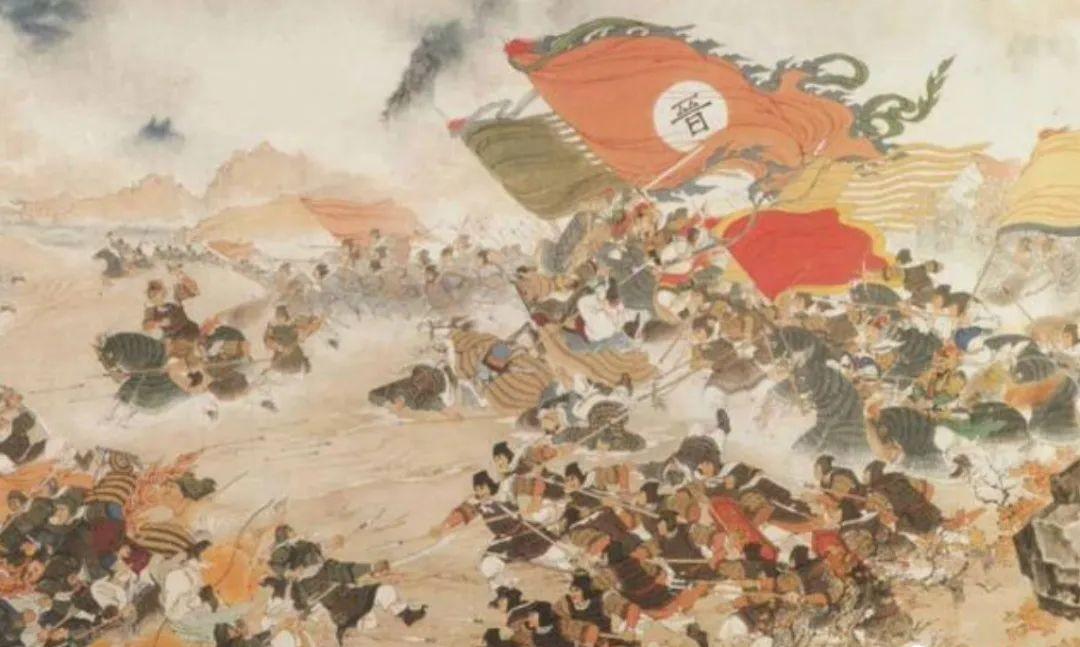Question: What are the peculiarities of the Wei and Jin Dynasties?
A: Aristocratic families run rampant.
The power of the magnates is in the same vein, the ruling group is closed, and the door valve and the imperial power are co-ruled.
The imperial power is constantly changing, while the family family is relatively stable. The influence of many clans of warriors was far greater than that of the royal family, and some clans could even depose the Heavenly Son. As a result, the royal power became no longer authoritative, leading to a social climate of contempt for the powerful.

(The Battle of Shuishui, picture excerpted from the Internet, invasion and deletion)
The collapse of political authority has made the Confucian value system no longer unique. Therefore, people who were freed from the shackles of ethical dogma began to think about the meaning of life, and the state of madness and debauchery prevailed and became the common spiritual outlook of the scholars. People have their own aesthetics, each follows their own ideas, and the open concept makes modern people stunned. Therefore, some people call it "beauty".
But, is this really the case?
A: As long as you understand a little historical facts, you will understand what cruelty is and what "human life is like grass." Long wars, repeated plagues, and in these three hundred years of chaos, people have experienced iterative regeneration close to the primitive state. Constant war and displacement of people were the reality at that time. Where does "beauty" come from?
Since this is the case, what else do you like about the Wei and Jin Dynasties?
A: Authentic.
This was an era of ritual collapse and bad music, Confucianism and criminalism competed in the court, and Tao buddhism metaphysics did its own thing. Everyone is at risk, so each finds a way out. In this era, there are Lu Ji's "but hate the merit is thin, the bamboo veil has nothing to announce", and there is also Zhang Han's "let me have a posthumous name, it is better to have a glass of wine immediately." The jagged polymorphic makeup dressed up the "Wei Jin wind bone" that went his own way, covering up the dilapidation of the chaotic world. Therefore, in the eyes of ordinary people, the people of this era:
Talking, drinking, taking drugs, is a disappointment and escape from reality.
Conquest, state-building, and dominance are disobedience to the fortunes of the times and responses to war.
Looking at faces, writing poems, and standing are satisfaction or resentment of the present.
(Image from the Internet, invasion and deletion)
But at the same time, the entire Wei and Jin Dynasties, the Southern and Northern Dynasties, was a period of great chaos and great killing, with forces from all sides competing, lives being destroyed, Hu and Han fighting, Hu Hu killing each other, and door valves fighting... From the beginning of the Rebellion of the Eight Kings to the unification of the Sui and Tang dynasties, the confusion and entanglement in the middle do not know how many historians who want to clarify the relationship between them have troubled.
The blue blood and yellow sand are pushed forward by the timeline, slowly unveiling the truth of the chaotic world, and making clever arrangements in time and space, so that this period of history reveals a clear background in the chaos and strife. Follow the idea of blue blood and yellow sand, from north to south, to see who is the winner of the Five Hu and Sixteen Kingdoms, and how many people are displaced to replace a new center of power.
Audio "Gossip and The Sixteen Kingdoms of the Two Jins"
We like history, we just plainly like it as it is.
The narration of the blue blood and yellow sand is not whitewashed or interpreted, but it is discussed on the facts and truly reproduced. Pull history into the present, let us feel the historical truth that spans thousands of years. Under the narration of the blue blood and yellow sand, those wars and disputes are the past and the clues, which are related to our understanding of geography, culture and politics, and get answers one by one from the chaotic appearances, which is not a pleasure!
Love the history and be moved by its authenticity. Looking at the prosperous Haiyan River Qing, too safe and healthy, I don't want to miss the chaotic homeland and the ambition of the birds. In such an emotion, the "beautiful" or "unbeautiful" of history obviously cannot be generalized in terms of partiality. Behind qiuxian asked the five stones to scatter, there is the growth and power struggle of some people, and the wish of some people to inherit peace in the world. Seeing the blooming flowers and sprouting new shoots in the mud is the true charm of history.
Looking back from the perspective of the present, a thousand years ago, those unimaginable days and nights, what kind of strife was there in the land of China? In the dark ages, where did those faint lights come from? And listen to the blue blood and yellow sand tell in detail "Gossip About the World of the North and the South"...
Audio "Gossip About the North and South Dynasties under the Heavens"